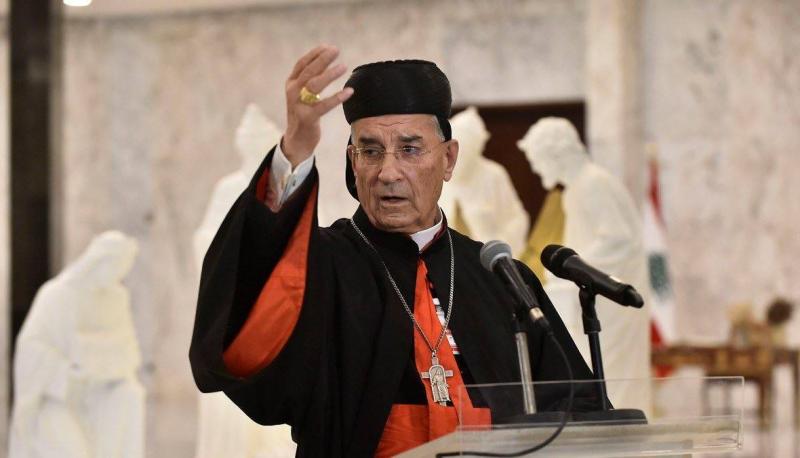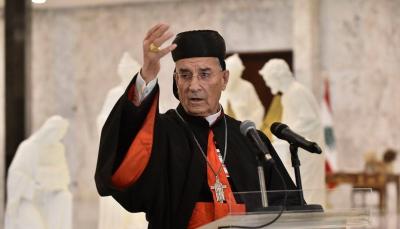The Maronite Patriarch Cardinal Mar Bechara Boutros Al-Rahi considered that "anyone who scrutinizes the movements of several deputies during the recent parliamentary sessions will immediately discover that they are engaged in a theatrical performance void of seriousness, instead of being in a happy celebration through which they present Lebanon with a president acceptable to the Lebanese people after a long period of sorrow and crises." He added in his Sunday sermon at the patriarchal headquarters in Bkerke: "The session of your council that took place last Thursday was two sessions: the session of presidential election inside the main hall, and the session of disrupting the quorum in the surrounding halls. It seems that a market for settlements and compromises is active among the distinguished deputies to determine whether they should enter the hall and vote or remain in the corridors and disrupt. We have reached the peak of political corruption, which is more wicked than financial corruption. We have now found ourselves in an oasis of national betrayal. Is there any betrayal towards the homeland more disruptive than delaying the election of the president of the republic?"
Under the title: "After a Long Time, the Lord of Those Slaves Returned and Held Them Accountable," he explained that the parable of the talents calls for accountability: "We hold ourselves accountable through daily examinations of conscience; church communities hold themselves and their leaders accountable through councils and spiritual retreats; the people hold their deputies accountable through elections; the parliament holds the government accountable; the president holds everyone accountable for their faithfulness to the constitution and the common good. Christ the Savior holds all people and nations accountable for the grace of creation, redemption, and sanctification. This Gospel text fits within the timeframe of the cross, which opens up to our personal life's end and the end of the world; thus, at personal judgment, one’s fate will be either eternal salvation or damnation. The talents that God distributes to all people are the means for achieving salvation, like the one who received five talents and delivered ten, and the one who received two and delivered four; but the one who neglected his single talent met with eternal damnation."
In the era of the cross, the theology of waiting becomes clear, as death marks the meeting time with God for the final judgment, and based on it, one’s fate will be either eternal salvation or destruction. Martin Heidegger, the philosopher, said: "Death is the future par excellence."
We celebrate this Divine Liturgy together and pray for the repose of our dear deceased Monsignor Tawfik Bou Hachem, who left us unexpectedly a year ago for the Father's house in heaven, leaving a profound wound in our hearts: the hearts of his mother and brothers, their families, his uncles and aunts, his cousins, and all his relatives, and in our hearts and the hearts of the youth and all who knew him in Lebanon and abroad. The tragedy was great, but hope was greater, as he reached heaven before us, as if we were in a race with him to it! He may have physically departed, but he remains with us in spirit, prayer, intercession, and his ever-present smile. His memory remains alive especially in the office of the Youth Ministry in the patriarchal circle, giving it an internal dimension in Lebanon, the Middle East, and the diaspora. Thanks to his generous heart and contributions, God multiplied his talents, one after another, like the one who had the ten talents.
The Gospel story shows that the talents are God's diverse gifts and blessings, applicable to society, the Church, and political authority. Human society is a community of persons organically linked by the principle of unity, based on communion and sharing. By communion, we mean the personal, human, spiritual, and social relationships woven among members of one community. By sharing, we mean the exchange of spiritual, material, and cultural goods of the earth. No one lives for themselves, nor does anyone retain what they possess solely for themselves. Because of communion and sharing, each person becomes an heir bestowed by God with talents and capabilities that enrich their identity, obliging them to cultivate them and invest them in service to others and the community (The Church in the Modern World, 25, Catechism of the Catholic Church, 1880).
The Church is also an organized community, organically and hierarchically structured, like the human body. It is the mystical body of Christ, as St. Paul says: "You are the body of Christ and its members, each in their place. God has placed in the Church first apostles, and then various gifts of healing, helpers, administrators, and different kinds of tongues" (1 Corinthians 12: 27-28). He speaks of the diversity of gifts distributed by the Holy Spirit: "There are various kinds of gifts and services: each one is given by the Spirit for their benefit: one is given a message of wisdom, another prophecy, another distinguishing between spirits, another speaking in different tongues, another interpreting tongues; all these are the work of one Spirit, distributing to each one as He wills" (1 Corinthians 12: 4-11).
Political authority is also entrusted with the talent of securing the common good, enabling citizens, families, and groups to achieve their fullest realization, and providing all social, economic, political, cultural, and artistic conditions that ensure their common welfare (The Church in the Modern World, 74). On this basis, "political authority is called to act selflessly in search of the good of all and the well-being of every citizen, especially those in greatest need, not for private or partisan interests, while governing the state and enacting laws and managing public affairs" (Address by Pope John Paul II to government officials and political leaders on November 4, 2000, paragraphs 1 and 2).
Among the requirements of political work are two social virtues: justice and solidarity. Justice is the pursuit of creating conditions of equality and equal opportunities among citizens, giving each their due, and working to prevent the rich from becoming richer and the poor from becoming poorer. Solidarity is the awareness that we are all responsible for one another, the assurance to overcome selfishness and open ourselves to the common good, both at the personal and state levels (Same reference, paragraphs 2 and 3).
The parliament, for its part, is entrusted with the most distinguished talents, according to Article 49 of the Constitution, which pertains to the election of "the president of the republic, who is the head of state and a symbol of national unity. He oversees the respect for the Constitution and the maintenance of Lebanon’s independence, unity, and territorial integrity." Given the importance of the president's position, which cannot remain vacant, Article 73 requires his election at least one month before the end of the president's term, and at most two months.
So, you deputies and parliamentary blocs who speak and work towards the vacancy in the presidential seat, tell us from where do you derive this right and justify your serious and blatant violation of the Constitution? Is your representation and your blocs created for disruption? Anyone who scrutinizes the movements of several deputies during the recent parliamentary sessions will immediately discover that they are engaged in a theatrical performance void of seriousness instead of participating in a joyful celebration to present Lebanon with an acceptable president after a long period of sorrows and crises. I mentioned an acceptable president, who should be a statesman, not a politician who only cares for his private interests at the expense of the common good.
Last Thursday’s session of your council consisted of two sessions: the session of the presidential election inside the main hall and the session of disrupting the quorum in the surrounding halls. It seems that a market of settlements and compromises is active among the distinguished deputies to determine whether they should enter the hall to vote or remain in the corridors to disrupt. We find ourselves at the height of political corruption, worse than financial corruption. We are now in an oasis of national betrayal. Is there any betrayal towards the homeland more disruptive than the delay in electing a president for the republic? And is there a clearer path toward the division of the homeland than the presidential vacancy? Is this how you respond to the statement issued by the International Support Group for Lebanon on October 5, calling for the election of the president within the constitutional timeframe, highlighting its importance and role both domestically and abroad under the current circumstances?
How and by what right, you deputies and parliamentary blocs, do you squander the talents that the Lebanese people entrusted to you according to the preamble of the Constitution (item D)? Do you realize that the movement towards a presidential vacancy is occurring while some countries seek to change Lebanon’s face, its role, its formula, and its identity without returning to the Lebanese people or its references? The international conference for Lebanon that we called for is entirely different from the conference and seminar projects devised by these countries, not to serve Lebanon, but to improve their relations with certain countries in the region. The fate of Lebanon is determined by the Lebanese with the assistance of the United Nations. We have called for a conference to implement the Taif Agreement textually and in spirit, to address the gaps resulting in the constitution, to correct the imbalances in the democratic system of governance, to announce the preservation of Lebanon's neutrality and to keep it neutral, to facilitate the return of Syrian refugees to their homeland, and to resolve the Palestinian refugee issue.
We raise our prayers to God to protect Lebanon and its people, so that this nation continues to actualize the talents of its mission in this East and in the world, raising glory to the Holy Trinity, the Father, the Son, and the Holy Spirit, now and forever, Amen.




